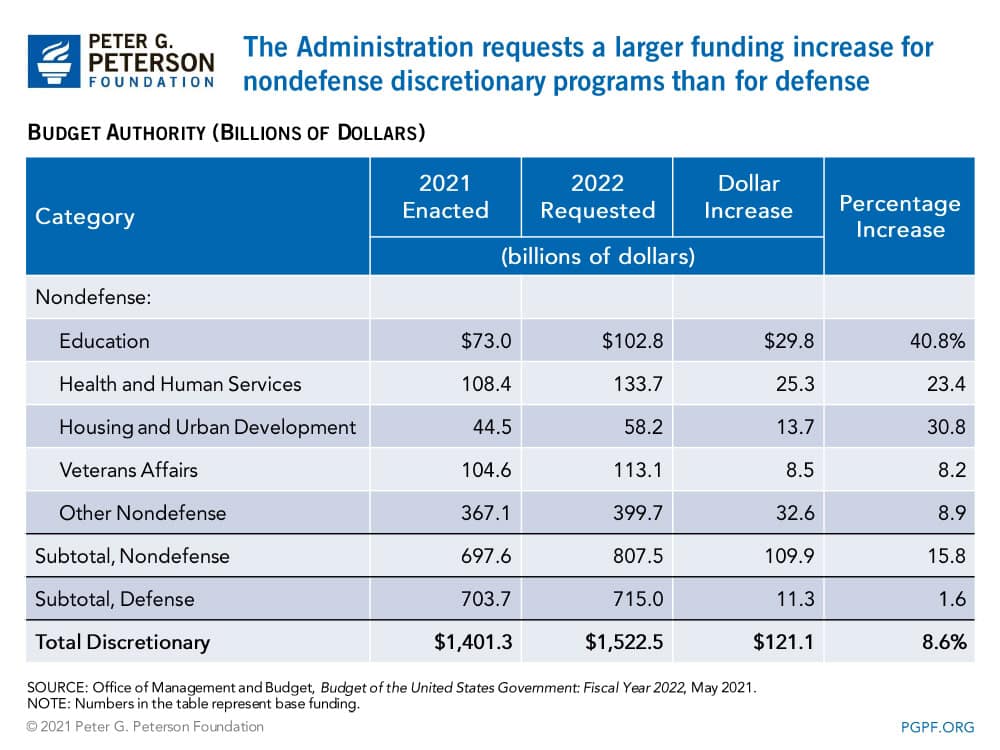President Biden’s Budget Calls for Increased Spending on Education, Housing, Veterans, and More
President Biden’s request for discretionary funding for next year (fiscal year 2022) would substantially increase funding for nondefense programs, particularly in the Departments of Education, Health and Human Services, Housing and Urban Development, and Veterans Affairs. Overall, the total discretionary request for 2022 (including both defense and nondefense spending) would be an 8.6 percent ($121.1 billion) increase from 2021 funding levels. Nondefense programs would see a 15.8 percent ($109.9 billion) increase, while defense funding would rise by 1.6 percent ($11.3 billion).

Below are further details about the four departments that would receive the largest shares of the increase in nondefense funding.
Department of Education
- Funding for the Department of Education would grow from $73.0 billion in 2021 to $102.8 billion in 2022, an increase of $29.8 billion (40.8 percent).
- The majority of the increased funding — $20 billion — would be for educating disadvantaged elementary, secondary, and vocational students. The President requests $37.2 billion for 2022, which would be more than double the $17.2 billion provided for 2021 and constitute the largest increase of any program in the department.
- Another major increase in the department is for student financial assistance in higher education, which would grow from $24.0 billion in 2021 to $27.5 billion in 2022 (a change of 14.6 percent).
Department of Health and Human Services
- Funding for the Department of Health and Human Services would grow from $108.4 billion in 2021 to $133.7 billion in 2022, an increase of $25.3 billion (23.4 percent).
- Most of the additional funding — $7.7 billion — would be for health research and training conducted by the National Institutes of Health. Their budget would grow from $42.7 billion in 2021 to $50.4 billion in 2022, a jump of 18.1 percent.
Department of Housing and Urban Development (HUD)
- The Department of Housing and Urban Development (HUD) would receive $58.2 billion — a $13.7 billion (30.8 percent) increase from the $44.5 billion enacted in 2021.
- Tenant-based rental assistance within the Office of Public and Indian Housing would receive a $4.7 billion (21.4 percent) increase, accounting for about one-third of the total growth in funding for the department.
Department of Veterans Affairs
- The Department of Veterans Affairs would receive funding of $113.1 billion in 2022, which is an $8.5 billion (8.2 percent) increase from the $104.6 billion enacted in 2021.
- Medical services for veterans would rise from $58.2 billion in 2021 to $62.1 billion next year — a $4 billion (6.8 percent) increase.
All told, the President’s 2022 discretionary funding request would put nondefense discretionary funding at 3.4 percent of GDP, which is below the 3.5 percent average ratio over the past 30 years.
Image credit: Photo by Alex Wong / Getty Images
Further Reading
Should We Eliminate the Social Security Tax Cap?
There have been a number of proposals to increase, eliminate, or otherwise adjust the payroll tax cap as a way to shore up Social Security’s finances.
No Taxes on Tips Will Drive Deficits Higher
Here’s how this new, temporary deduction will affect federal revenues, budget deficits, and tax equity.
Three Reasons Why Assuming Sustained 3% Growth is a Budget Gimmick
GDP growth of 3 percent is significantly higher than independent, nonpartisan estimates and historically difficult to achieve.


